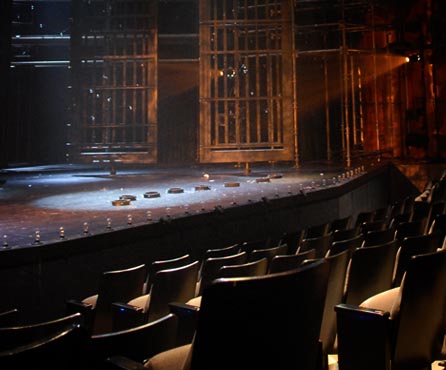
STAGE REVIEW: A WITTY CONTEMPORARY ‘MIKADO’ AT CMU
It isn’t usual for me to get to shows by the CMU Music School (as opposed to Drama), but the current “Mikado” offered three strong attractions: it’s Gilbert and Sullivan, and I’m an addict; it’s directed by Gregory Lehane, an inventive director of comedy (disclosure: we work together on the annual “Off the Record” spoofs); and it’s designed by Peter Cooke, the new head of CMUdrama, in what I’m pretty sure is his creative debut here.
All three attractions pan out, so here’s your advisory: there are only three more performances, Friday and Saturday nights and Sunday matinee.
But there are more reasons than these three to see “The Mikado, or, The Town of Titipu,” leading off with the strong orchestra, directed by the indefatigable Bob Page. It must be the largest (35!) to tackle G&S that we’ve heard in Pittsburgh. Indeed, it’s one of the largest and richest I’ve heard in a lifetime of dozens and dozens of G&S performances in Pittsburgh, New York, Canada and London.
I’d go to hear the delicious score, alone. There are also the fine student voices, some especially so. The acting isn’t generally up to what CMU drama students do on that same stage, but some is very good, and the result is what you want from G&S: witty, beautiful, silly and touching, all in turn.
And mainly, there’s the work of Lehane and Cooke, who have taken “The Mikado” (1885), written to be a spoof of Victorian England refracted through a Victorian view of Japan, and set in a modern high school gym. A program essay, some of the accents, the union jack painted on the floor and the large portrait of Queen Elizabeth II that descends for the finale all suggest that the school is in England, but the school uniforms (short plaid skirts for the girls, white shirts and skinny ties for the guys, plus a few i-phones), erratic accents and the general behavior make it just as likely to be set at, say, Central Catholic High School (Lehane’s alma mater) a few blocks away.
Presumably this is a rehearsal run-through, as the opening horseplay suggests. But gradually the cast adopts more elements of costume, especially light blue kimono-like gowns and red fans that snap with crisp theatrical authority, culminating in the Act 2 entrance of the emperor (the Mikado, Tim Ruff) in full oriental polish.
Mikado girls
This concept provides an extra layer of comedy, a sort of high school parallel that makes sense, given that G&S used to be a high school staple — and it even makes sense in the story, since the female chorus are all young ladies from a Japanese finishing school. (The males are supposedly Japanese lords, but you can’t win them all in a conceptual remake.)
Anyone who knows the show will have fun spotting the different characters in the initial pre-rehearsal hurly burly — the confused guy with a trombone must be the young hero, Nanki-Poo (Ryan Townsend); the woman in odd garb must be the angry contralto, Katisha (Melissa Johnson); and even the three vain girls, swaggering in unison, are bound to be the “Three Little Maids from School” (Yum-Yum, Piti-Sing and Peep-Bo — Kristen Hahn, Loghan Bazan and Meghan Schiller).
The odd fellow preening and knitting and practically doing cartwheels offstage has to be the comic lead, Ko-Ko (Adam Hill), and the imposing tall fellow in a suit must be the ineffable lord-for-hire, Pooh-Bah (Hans Tashjian).
Four of the leads are double-cast, so I can’t speak for those you might see. And as I say, they are all from the School of Music, so you don’t expect a great deal of acting. But Hahn is all you could wish as the calculatedly demure young heroine, and Hill is a frenetic, physically eccentric comedian. I was also impressed with the stage command of Bazan and the welcome diction of Scott Beasley (Pish-Tush).
Diction is a problem, with the big orchestra and voices sometimes more operatic than musical comedy, so CMU provides projected lyrics, which I’ve never before seen in G&S. But as I say, I’m an addict, and some audiences need the assistance; it certainly beats following along in your libretto, as some do at Pittsburgh Savoyards performances.
Cooke’s set isn’t just a gym: the flag on the floor and a slice of sky above the basketball hoop give it a surreal tinge, and the paper lanterns, such as you might see for a school dance, suggest Japan. They also take Todd Wren’s lights beautifully, as in Yum-Yum’s delicious “Sun and Moon” solo.
Lehane has pruned some dialogue, as I know he likes to do from his “Off the Record” work. He’s an inventive, audience-friendly director, moving the show as briskly as possible, complete with purposefully limited choreography (though Peter Cope is on board for more complex movement). And Lehane’s not above inserting comic bits that appeal to the audience more than they might have to librettist/director Gilbert.
As is the tradition, CMU has re-written many of the lyrics to Ko-Ko’s “Little List” and the Mikado’s “To Make the Punishment Fit the Crime,” so there are plenty of contemporary laughs directed at CMU, Pittsburgh and national foibles. G&S is a gift that keeps on giving.
By senior theater critic Christopher Rawson, who can be reached at crawson@post-gazette.com.
To view the original article, Click Here.